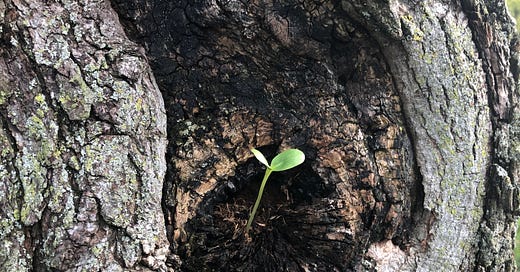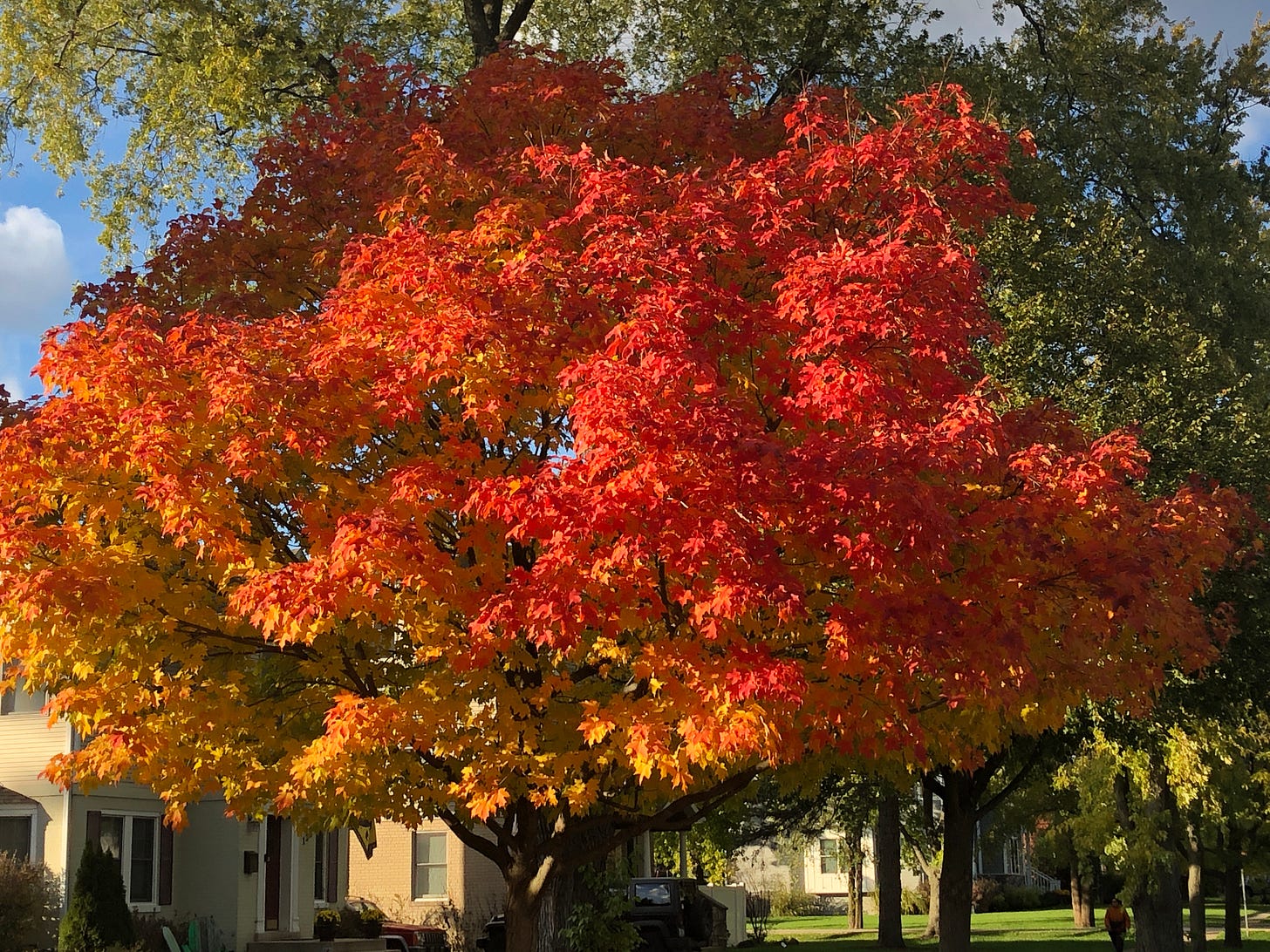The walk with the dog that morning took me around our neighborhood along the streets I knew, certainly, but hadn’t often traveled by foot. What called me there was the light. The sun that morning glimmered at that wonderful autumn angle—low and golden. On one side of the street in the crotch of an old tree was the single growth of a plant. The bright green stem grew out of the soil that had gathered where a limb had once been and natural healing had given way to a hard knuckle of bark. The growth was delicate and innocent, a sign of new life in the season when the world was in the process of accepting its yearly demise. And across the street, another sign of the time of year. As the small growth in the tree may have been life hanging on, this was life letting go.
Along the sidewalk was a tall maple, its leaves had turned fire red and bright yellow, and the sun edged its way through the nearby houses, acting like a prism to enhance the colors. I walked on the street, the dog on her leash, and adjusted my phone for a photo. I took one and another. As I began to walk away, a homeowner emerged from his garage. He noticed me and smiled.
“Magnificent tree,” I said.
“There have been a lot people stopping to take photos,” he said.
“It’s not only the tree, but the light. Pretty special, “ I said.
“You’re not alone.”
How wonderful to know that, I thought. Others noticing. Others finding what I had found. Others caring to take a moment and consider what would soon be fleeting beauty.
There are many times I have taken similar walks and instead found the world so very closed. Walkers reading from their phones as they move, rarely looking up. Joggers with earbuds in tight, avoiding eye contact. Mothers pushing strollers as if they are engaged in a race against time.
I’ve been reading a new book of essays written by admirers of Henry David Thoreau. Writers have long had a deep relationship with the man in the cabin. Now Comes Good Sailing takes an intimate and varied look at an American hero, one that has been at times diminished to Hallmark cards and motivational posters quoting lines from Walden, a book most of us know about, but few have studied. Many have been exposed to Thoreau and his works only through those quotes. But Walden is far more than inspirational phrases offered to remind us of nature, individualism, self-reliance, and simplicity. And Thoreau is a much more complicated man than the myth—the hermit who ran away to a tiny cabin in the woods, even if it was just a mile or so from Concord.
I first read Walden in high school. I hated it. The language was heavy, verbose, dense in the style of the mid-1800s. The messages, however, were not lost on me. I had a good teacher, and later I was thankful for that. I also was enamored with his name. Henry David Thoreau. It had such a musicality to it, an elegance. (His given name was David Henry, and that was even better because we shared the same first name.) Years later, I read Walden again. I had helped direct a play in college — The Night Thoreau Spent in Jail — about Thoreau’s civil disobedience, his refusal to pay taxes to a government that allowed slavery. That play—and the fact that I was simply growing up—reopened my sensitivities to Walden and Thoreau, this transcendentalist, naturalist, solitary man. And that name? I still loved it.
Then life happened.
Careers, marriage, kids, houses, apartments, travel, deaths of friends and family, aging, a minor heart attack, a new marriage, weight gain, a grandchild, weight loss, hair loss, a beard, a tight shave, another beard, new careers, writing, more writing, music, more music—and through it all, Walden and Henry David had faded from my life. Whenever his name surfaced in conversation, or in an article, or on a poster or social media meme, I would smile. Thoreau had been lost in the flow of my life, but pieces of him remained, covered in layers of time, still there.
Over the decades, little by little, I learned more about Thoreau. Tiny details had come in small doses. He didn’t like coffee, (for me, that might have been a big strike against him), he questioned sensuality, he had a narcissistic streak, he was an excellent ice skater (skating regularly with Nathaniel Hawthorne and Emerson), he had a remarkable social side—more than the myth permits—even hosting an annual melon party. But he was also, to some, an unapproachable misfit. No hero is perfect, surely. For me, however, none of the rough edges mattered, the good of his writing and his keen and lasting observations of the world and the self carried him beyond his quirks and flaws.
There remained the major critics. Thoreau was a fraud, they said. He ran away to the woods but frequently went to town to have dinner at the home of his friend and mentor—Ralph Waldo Emerson. He took to the woods to avoid real work, to avoid community and commitment to family. He was a bum. A loser. A fake.
I do not pretend to be a Thoreau scholar. But I’ve read a great deal about him over the years, albeit inconsistently. Here is what I have come to believe.
Thoreau built his simple cabin near Walden Pond not to run and hide. He built it as a writing retreat. That’s what Walden was truly about. He had tried to write in other places, including New York City. It didn’t go well. The cabin was his sacred writing space and the book he produced is the story of a man finding his way through the natural world.
He wanted to live “deliberately” not to live like a hermit or a recluse. He wanted to weigh his world and consciously consider his life decisions rather than follow the crowd. That took solitude. How can that not be invigorating? Inspiring? That’s the essence of personal freedom.
Thoreau called on us to live with simplicity. Not to shun life, but to embrace it through considering what truly matters. Who hasn’t thought about turning away from modern society for even the smallest of moments? Ditch the phone for one day. Just one day.
And Thoreau and Walden have helped teach me to see the world, the natural world. Really see it. Breath in the air of the seasons, walk and not run, live among the trees and flowers and pay attention to all of it.
My morning walk that day had taken me south to the railroad tracks and back, and on the return I again spotted that small growth in the big tree, that tiny, delicate green plant raging “against the dying of the light,” to quote another of my writing heroes. He, too, with plenty of flaws. I stood for a moment and took in the plant, then captured it on my phone camera, as I had the golden maple. Henry David probably would have hated the idea of taking pictures. Photography was very new in his era, even suspect. But I like to think that he would have captured that emerging plant in his own way, maybe in a pencil sketch in his journal.
He, too, would have wanted to remember it just as I did.






I enjoyed your take on Thoreau and of course the picture of the tree was magnificent! Your insights are perfect to help start or finish my day. Thanks.
Beautiful picture of the tree! I enjoy your stories very much. Did you have a chance to check out my new poetry collection LISTEN? Also much about aging!